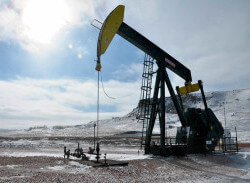 A new process has been set up for fracking applications to ensure that the government can fast-track appeals without lengthy decision-making.
A new process has been set up for fracking applications to ensure that the government can fast-track appeals without lengthy decision-making.
The measures include identifying councils, which repeatedly fail to determine oil and gas applications within the 16-week statutory timeframe, with subsequent applications potentially decided by the communities secretary.
We’re rather bemused by the decision to create such a process. Energy secretary, Amber Rudd had impressed the importance of local communities having the power to veto wind farms and fracking. Yet she’s soon backtracked allowing these vetoes to be quickly overturned by a government representative.
This will not go down well with local communities and protesters, with fracking already in the firing line for its potentially hazardous effects on the environment. Although geologists believe the UK has large deposits of shale gas, the fracking industry has been struggling because of intense public opposition, amid concerns over water contamination and earthquakes and the difficulty securing necessary drilling approvals.
Rudd defended her decision:
“We need more secure, home-grown energy supplies and shale gas must play a part . . . We can’t continue with a system that sees applications dragged out for months, or even years on end which doesn’t give certainty to industry and which could spell the end of a potentially vital national industry.”
She further rallied the benefits of fracking by saying that the UK could not afford to miss out on billions of pounds in revenue and the 60,000 new jobs that the technology could potentially create.
She assured the public that local communities will remain fully involved in planning decisions with any shale application, whether decided by councils or Government. She insisted that stringent planning rules to ensure that shale development happens only at appropriate sites will remain unchanged.
Changes to process mean that all planning call-ins and appeals involving shale applications, will now be prioritised by the Planning Inspectorate on a case-by-case basis.
Rudd continued:
“To ensure we get this industry up and running we can’t have a planning system that sees applications dragged out for months, or even years on end.
Oversight by the Health and Safety Executive and the Environment Agency of shale developments makes our commitment to safety and the environment crystal clear. We now need, above all else, a system that delivers timely planning decisions and works effectively for local people and developers.”
The rules will make it easier for the communities secretary to hear appeals such as Cuadrilla’s, whose application was denied by local councils. Interventions are rare but may become more common as the government presses the case for shale gas.
It seems to us like this is the first step towards the government promoting fracking and side-stepping public opposition. They promised the public the power to turn down applications in their local area and reassured us that we’ll hit carbon reduction targets set by the EU.
Yet behind the scenes they’ve cancelled wind and solar farm subsidies and are ploughing money into nuclear and fracking.
Shouldn’t we be focussing on developing clean energy?
For more information on renewable energy, give us a call on 0800 051 5770.
